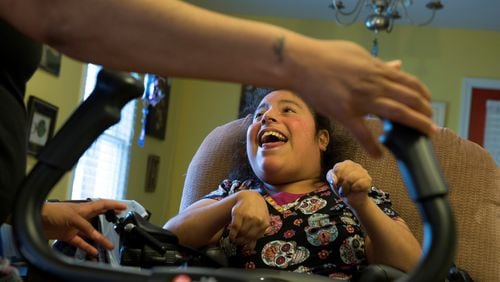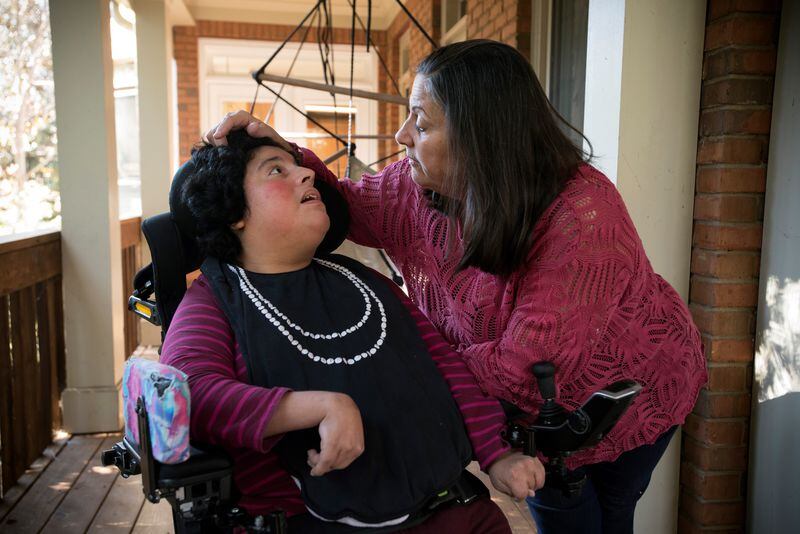For most of her adult life, Gabby Dollar has been the recipient of a federal Medicaid waiver that has allowed her to live independently.
That’s the good news. The bad news is that could change any day now and Gabby’s life once again would be thrown in flux.
Under proposed changes to the waiver, she will no longer qualify for the around-the-clock care she needs to remain in her Lawrenceville home. And given the level of care she needs, living in a group home or in adult foster care is simply an impossibility.
You see Gabby, 31, is severely developmentally disabled. She can’t feed herself. She can’t dress herself. She can’t walk or communicate verbally except in one- or two-word phrases. She needs care 24 hours a day.
She is not alone.
According to Commissioner Judy Fitzgerald, the Georgia Department of Behavioral Health and Developmental Disabilities, through its waiver programs, supports more than 13,000 Georgians living with intellectual and developmental disabilities; and there are another 7,000 Georgians who are on the agency’s planning list.
Sadly, this is not new. Without fail, stories like Gabby’s bubble to the top of the news cycle nearly every year. They are either on an intractable waiting list for services or, because of rule changes, are in danger of losing the services they once enjoyed.
This shouldn’t be.
How can these young adults ever be fully integrated into the community if they can’t depend on the help they need to make this possible, when the goal post keeps moving?
Fitzgerald acknowledged change is difficult and scary, especially for those with disabilities and their families.
“One thing will not change,” she said. “DBHDD is required and strives to meet the needs of every individual who receives waiver services.”
For those who will experience changes, Fitzgerald said that she, her team, and network of providers will work to ensure everyone’s services are designed in a person-centered and collaborative process that empowers them to live safely and independently.
Shelly Dollar said she learned of the proposed changes three months ago when the agency sent out a notice of an upcoming town hall meeting.
Because Shelly Dollar suffers from a severe heart condition and both she and her husband, Dr. Allen Dollar, are getting older, she worries her daughter will have no safe living options available to her.
Credit: Courtesy of Robin Rayne/ZUMA
Credit: Courtesy of Robin Rayne/ZUMA
“This proposal affects Georgia’s most vulnerable citizens and jeopardizes their ability to live in the least restrictive community setting because of their cognitive and physical conditions,” Dollar said. “They will lose their homes. They will lose the care they require to live their best lives.”
The Comprehensive Supports Medicaid or COMP waiver is one of two designed under Medicaid authority and administered by DBHDD to empower individuals with intellectual and developmental disabilities to live safely and independently in their communities.
The waiver, which must be renewed by the federal Centers for Medicare and Medicaid Services every five years, will expire in March.
Ashley Fielding, assistant commissioner, said they used this review period to examine services that aren’t widely used, and redirect resources into areas where demand is higher.
The proposed change that set Dollar on high alert involved two services offered with the Community Living Supports (CLS) program: Skilled Nursing and Additional Staffing.
Instead of the 24/7 care previously available under the CLS program, the department has proposed putting a cap on those services ― a six-hour maximum daily authorization for Additional Staffing services and a 16-hour maximum daily authorization for Skilled Nursing Services in the CLS program.
The six-hour maximum for Additional Staffing services would still allow an individual to receive approximately 16 hours daily of paid services through the COMP waiver program.
Fielding said there is another program available to serve individuals who need 24-hour care, but it may require a community living arrangement with one — but no more than three — roommates. Individuals who must live alone due to their medical or behavioral needs or due to the requirements of an active criminal court order, for example, would qualify for an exception.
Dollar insists, however, that her daughter and many like her can’t live in group settings because of the level of care they need.
“Some of them have become self-injurious and/or aggressive with others when forced to live in a group home setting,” she said. “They can’t tell you why aggregate living situations don’t work for them other than by their acting out behavior for which they are typically punished by those who should be their advocates. It’s heartbreaking.”
Fielding said that DBHDD has requested a transition period to allow ample time for adjustment for those individuals who are affected by the proposed changes and all affected individuals will receive Intensive Support Coordination services during the transition period, under the proposal.
The proposal is under review by the CMS.
Dollar said the department’s proposal amounts to a “one-size-fits-all approach where individuals are essentially herded together.”
“The time when developmentally disabled individuals were segregated away from the rest of society is over and forcing them ... to move into institutional-group home settings is not only inappropriate, it is just wrong.”
I can’t argue with that.
Dollar said she hopes the waiver will remain as is so that Gabby and the others can remain in their homes.
Find Gracie on Facebook (www.facebook.com/graciestaplesajc/) and Twitter (@GStaples_AJC) or email her at gstaples@ajc.com.








